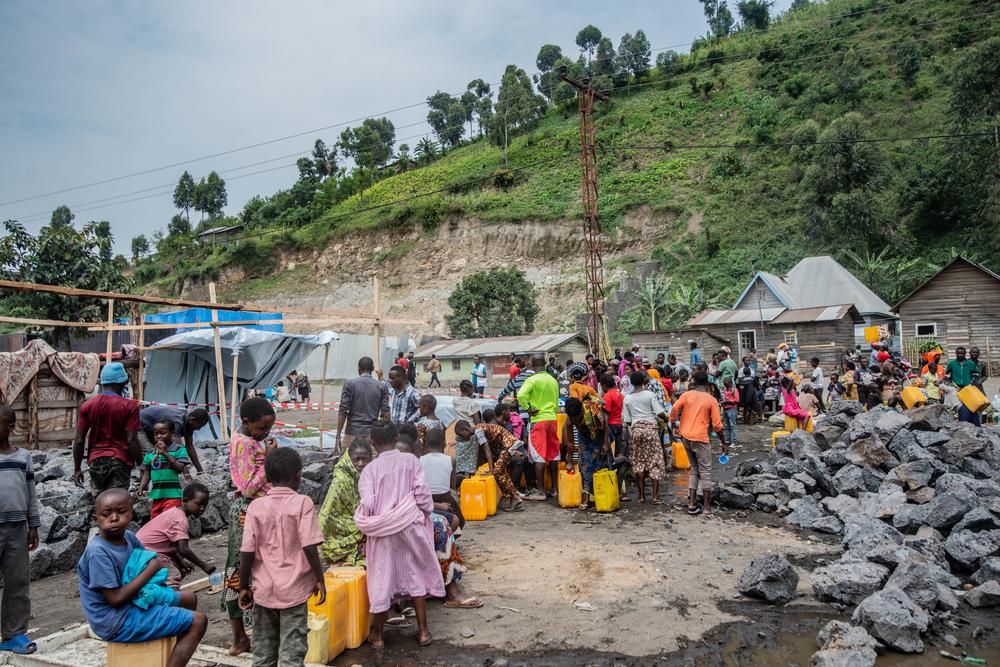“We are assisting the immediate needs of displaced people, but it is not enough,” says Magali Roudaut, MSF head of mission in DRC. “More clean water should be urgently provided; cholera is endemic in the area and poses a huge threat to people, including to the host communities.”
“There are urgent needs that are still unmet such as food, latrines, shelters, blankets, and jerrycans for water,” says Roudaut. “We demand urgent support of other humanitarian organisations to assist people.”
Half a million displaced and without clean drinking water
Mount Nyiragongo, considered the most dangerous volcano in Africa, erupted on 22 May near Goma. So far, 31 people have been reported dead after the eruption as a direct or indirect consequence of it, according to the UN Office for the Coordination of Humanitarian Affairs (OCHA). Several buildings have been severely damaged or have collapsed, including health structures and water and electricity supply systems in some areas of the city. More than 500,000 people have been deprived of access to drinking water, as Goma’s main reservoir and the pipes were damaged during the eruption.
Around 400,000 people have been displaced and are on the move, fearing the continuous seismic and volcanic activity.
“We have seen a steady flow of people leaving Goma carrying mattresses and other belongings,” says Roudaut. “They go either by car or on foot towards Sake, a city 25 kilometres west of Goma, as well as towards Rutshuru and Minova, or by boat to Bukavu.”
Some people have also crossed the border into Rwanda. Although movements of people had slowed down at the start of the week, the authorities’ order for the partial evacuation of Goma on 27 May led to the departure of hundreds of thousands of more people.
MSF teams are providing assistance to displaced people in Sake, where between 100,000 and 180,000 people are gathering in churches, schools, mosques, and on the streets, looking for food, water, shelter and healthcare.
MSF providing medical care and preventing cholera
We are focusing on preventing cholera from spreading and treating patients with the disease. Our teams are also undertaking epidemiological surveillance, as well as providing drinking water, scaling up storage capacity to 125,000 litres, which can be refilled by trucks depending on people’s daily consumption.
We are also providing medical care to people in health centres and hospitals supported by MSF, with our teams having provided 202 consultations on just the first day of our emergency response in Sake. Three people from the internally displaced people’s settlement were admitted in the cholera treatment centre with suspected cases, but all test results came back negative. Nonetheless, this illustrates the risk of cholera for the people of Sake.
Providing healthcare and essential services across North Kivu
MSF is also providing access to hygiene and sanitation facilities in Goma, where our teams are building latrines for the displaced people. We have donated 100 mattresses to the Goma provincial hospital in order to improve hospital conditions.
In Rutshuru, North Kivu, which hosts some 25,000 displaced people, our teams are supporting the hospital and two health centres in the neighbourhood. MSF teams are providing basic healthcare and referring more complicated cases to Rutshuru’s hospital.
We are also working to limit the impact of the disaster on the patients we assist in the 12 projects we support in coordination with the Ministry of Health in North Kivu, South Kivu and Maniema provinces. Ituri province, where MSF is present in four health zones, is also affected by the consequences of the volcanic eruption, since it depends on Goma airport. The closure of Goma’s airport is forcing us to reconsider supply routes for equipment and medicines, but also for the movement of our teams. They are constantly reassessed in order to ensure the continuity of the healthcare we provide in these health zones.
